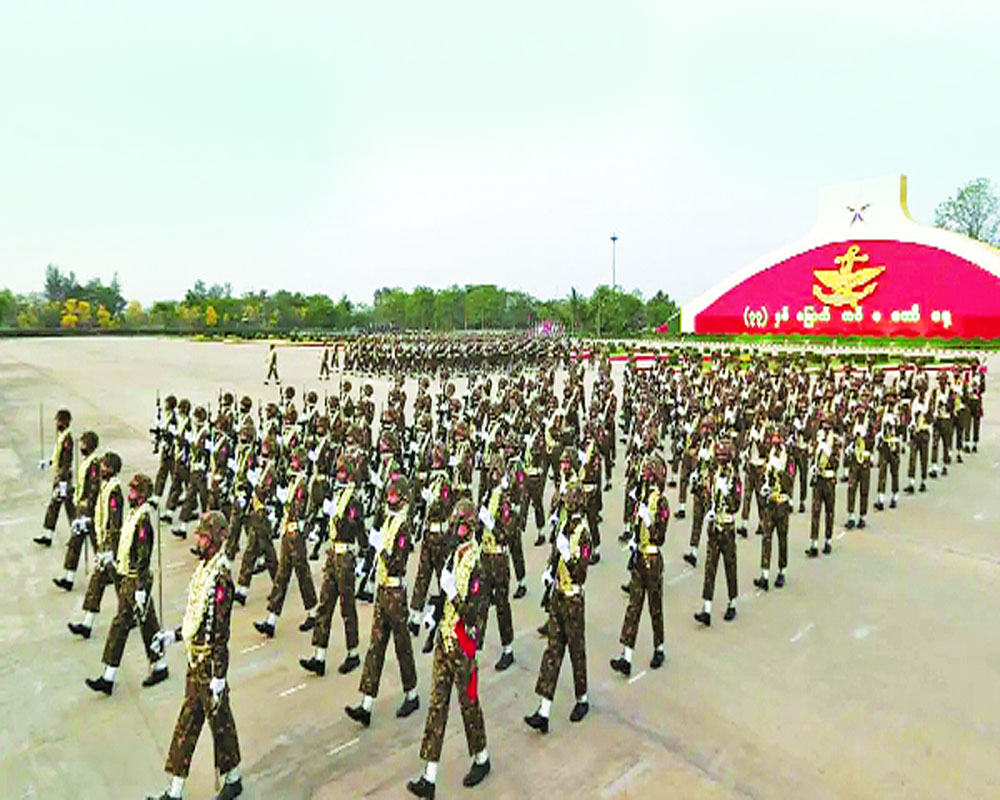Given the changed dynamics in Myanmar, supporting the Military regime appears to be a lost cause as its decline and fall are inevitable
Oftentimes, we fail to see the forest for the trees. Manipur is one such example. Our focus on the trouble there has been so intense that we have all but ignored the bigger picture of what is happening in the neighbourhood, especially Myanmar, which is deeply embroiled in the happenings in Manipur and the North East in general.
Ever since it gained Independence in 1948, Myanmar has had a very chequered history with the military having intervened on numerous occasions. The coup of 1962 set the stage for the military to assume power, which it has never relinquished fully, despite a nominal return to democracy following the uprising of 1988 and again in 2010 that led to the formation of civilian-led governments. Once again in the General Elections of 2020, Aung San Suu Kyi’s National League for Democracy (NLD) won a clear majority, but its government was overthrown by the military Junta led by Senior General Min Aung Hlaing which continues to rule.
The major ethnic group in Myanmar are the Bamar who constitute nearly 68% of the population, who mainly live in the vast central and coastal plains of the country. Numerous other ethnic groups make up the rest of the population, among which the Shan, Kachin and Chin are the more populous ethnicities that mainly live in the hilly regions, bordering Thailand, China, India and Bangladesh. In fact, before Independence, the Panglong Agreement was negotiated between General Aung San, the leader of Burma, and the Shan, Kachin and Chin leaders.
The Agreement provided for full autonomy for areas inhabited by these ethnic minorities, with the option to secede ten years after Independence. However General Aung San was assassinated in July 1947, just six months before Independence, and the Agreement was never honoured by his successor President U Nu. This, along with an insurgency fomented by the Communist Party of Burma (CPB) with the support of Communist China, have been the main drivers of the civil war that has raged since then. This was also the major reason for the deep divide between the ethnic minorities and the Bamar majority.
However, the rebellion following the coup of 2021 is substantively different from the past resistance that the Myanmar military has faced. For the first time, the majority Bamar population has allied itself with other rebellious ethnic groups to defeat the military Junta because of the atrocities that it has also been subjected to. The rebellion has coalesced with ethnic militias and political parties joining under the umbrella organisation, the National Unity Government (NUG), led by deposed Members of Parliament.
The fact that the Junta-led Myanmar Armed Forces draws much of its numbers from the Bamar community makes it particularly vulnerable in the present round of conflict as it is finding it extremely difficult to recruit soldiers. As a result, by some accounts, the Junta controls only the major population centres and between 40- 60% of the countryside. In the past three years over 23000 civilians have been killed, approximately 1.6 million internally displaced and around 55000 have fled to neighbouring countries, mainly India. This has adversely impacted its economy.
We share, approximately, a 1700 Km long border with Myanmar with around 135 ethnic groups living on both sides, the main ones being the Naga, Meitei and Kuki, though known by different names. For them, tribal loyalties and families on both sides of the border make it an artificial construct. A fact recognised by both governments which have mutually allowed free movement of people up to 16 Km on either side. This makes the border porous and whatever occurs on one side invariably impacts the other.
Not surprisingly, the troubles in Myanmar have led to approximately 45000 refugees seeking shelter here, mainly in Mizoram and Manipur, as the Kuki, Chin and Zo tribes have shared ethnicity. This aspect is also reflected in the ongoing internal conflict in Manipur in which the Kuki community has been targeted by the Meitei majority on grounds of alleged illegal immigration by the Chins and their involvement in poppy cultivation. The situation is further complicated by the fact that the Meiteis in Myanmar are allied with the Chinese-supported Junta, while the Chins are arraigned against them. If that were not enough, we have elements within the Naga and Meitei population that have been fighting for secession for decades.
In the circumstances, our siding with the Myanmarese Military over the years was understandable as it ensured they didn’t add to our troubles by supporting secessionist elements here.
However, given the changed dynamics in Myanmar, supporting the Military Junta appears to be a lost cause as its decline and fall are inevitable in the long run. Till the situation stabilises, which is possible only after the military is removed, our act East policy is a non-starter. While we will face some difficulties in the interim, it is time for us to change horses and focus on supporting the NUG. In any case, the increasing presence of rebel forces in the Sagaing Region, bordering India, suggests the decreasing influence of the Army, and in turn, its ability to support elements inimical to us.
(The author, a military veteran, is a Visiting Fellow with the Observer Research Foundation and a Senior Visiting Fellow with the Peninsula Foundation, Chennai)


























